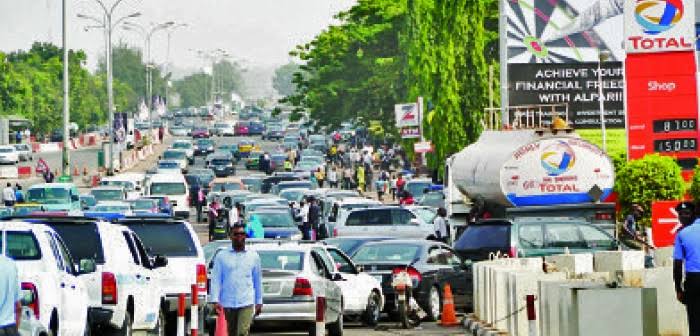On May 29, 2023, President Bola Tinubu announced the removal of the fuel subsidy, a move that was supposed to end years of financial mismanagement and corruption in Nigeria’s oil sector. However, more than a year later, Nigeria is still grappling with a worsening fuel crisis marked by soaring prices, scarcity, and long queues at fueling stations, particularly in Abuja. This persisting chaos raises fundamental questions about the government’s strategy and its promises of stabilization and reduced costs.
The decision to remove the fuel subsidy was positioned as a necessary step to ease Nigeria’s fiscal burden and create a more efficient market. In theory, the elimination of subsidies should allow fuel prices to be determined by market forces, driving competition, and reducing inefficiencies. However, the reality has proven to be starkly different. Prices have surged from around N200 per liter to more than N500, and in some cases, up to N1000 per liter during severe scarcity periods. Instead of relief, Nigerians are facing increased transportation costs, rampant inflation, and a spike in the overall cost of living.
Despite the government’s assurances, the anticipated benefits of subsidy removal have failed to materialize. Even the much-anticipated Dangote Refinery, which began operations in January 2024 and was touted as a game-changer for Nigeria’s downstream sector, has yet to make a meaningful impact. The Nigerian National Petroleum Company (NNPC) remains the sole buyer of petrol from the refinery, limiting competition and the potential for price stabilization. Additionally, NNPC’s ongoing financial struggles, including a $6 billion debt to oil traders, have further hampered its ability to distribute fuel effectively across the country. As a result, the daily struggles of Nigerians remain unchanged, characterized by endless queues and unpredictable fuel prices.
Public frustration is mounting. Social media is flooded with complaints from Nigerians lamenting the continuous fuel scarcity and exorbitant prices. Keke Napep drivers, taxi drivers, and other transportation workers are particularly vocal about their hardships. A viral video shows a man saying, “I beat people at the polling unit, and now they slapped me at the fueling station,” capturing the irony and hopelessness of many who feel betrayed by a system they defended. Nigerians are calling for a second wave of #EndBadGovernance protests, planned for October 1st, but there are indications that these protests could erupt sooner as public anger reaches a boiling point.
These grievances highlight a critical need for the government to provide clarity and transparency. The promise that subsidy removal would lead to market stability and lower costs has not been fulfilled. Instead, it has exposed deeper structural inefficiencies within Nigeria’s downstream sector, such as the country’s heavy reliance on imported fuel and the poor management of existing refineries. Despite government claims of refinery operations, there has been little to no improvement in fuel availability.
Rumors are circulating that the government may still be indirectly subsidizing fuel, or that corruption and mismanagement are preventing the benefits of subsidy removal from reaching the average Nigerian. The skepticism among citizens is palpable, with many questioning, “If the subsidy is gone, why are we still buying fuel at these outrageous prices? Where is all the money going?” The lack of transparent communication from the government only adds to this growing distrust.
The government must confront the underlying issues head-on, provide clear explanations, and present a practical plan to resolve the persistent fuel scarcity and high prices. Nigerian citizens deserve better than vague assurances and half-baked policies that only compound their daily struggles.
The government needs to act swiftly to address the structural issues within the sector, diversify fuel supply sources, and ensure the equitable distribution of fuel. The people’s patience is wearing thin, and without immediate intervention and clear communication, the situation risks escalating into widespread civil unrest. As the October 1st protests draw near, it remains to be seen whether the government will heed this urgent call for reform or continue to turn a deaf ear to the cries of its citizens.

